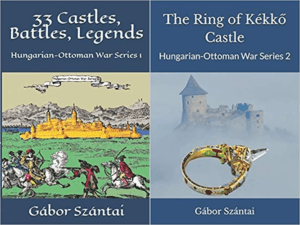Nagyida

Nagyida (Velká Ida) is located in the Upper lands/Horná Zem/Felvidék, in Slovakia. The place was named after the small Ida River or rather stream which flows next to it. The village is 16 kilometers to the southwest of Kassa (Kosice, Kaschau). In the old-time, this distance meant a two-hour walk so the inhabitants could sell their products well in the big town. The settlement was famous for its agricultural goods and for its fertile lands. No wonder they held great markets that helped the settlement to prosper.

The name of Ida appeared first in the document of King Béla IV in 1251 and once more in 1275.
The castle was built in 1406 by the Chief Judge of the Kingdom, Perényi Péter. All we know is that this high lord was signing his letters in the castle of Ida in 1417. (Please note, that I am using the Eastern name order for Hungarians where family names come first.)

When the Bohemian Hussites broke into the Upper Lands, they took many prisoners of war, and in the fashion of medieval warfare they demanded ransom for them. This was how Jan Giskra, their leader got Ida Castle, it was ceded to him as a ransom.
When the Czech mercenaries were either fought or hired by King Matthias, the castle was returned to the Perényi family.

The legend of Nagyida is connected to the 20-day-long siege in 1556 when King Ferdinand`s army took the castle. After slaughtering the Gypsies and the Hungarians of the castle, Ferdinand`s men utterly destroyed the castle in revenge for their losses suffered during the particularly bloody siege. Yet, the trenches and the moat of the castle can be clearly seen in our days.
There was a stately home in the small town in 1671 but ten years later it was in ruins. The Csáky family had a huge palace there in the 18th century.
Now, there are still many Gypsies in the settlement but they deservedly have a most heroic tale which made them and Nagyida famous.

Here is my dramatized short historical story about the legend of Nagyida (an extract from my book “33 Castles, Battles, Legends”):
The Gypsies of Nagyida Castle
Nagyida Castle was inherited by the two Perényi brothers, Mihály was the older one, and Ferenc was the younger one. They could have lived in peace but they couldn’t agree about the castle. They kept on arguing until one-day Mihály had had enough and set out for hunting for a change. When he returned, the gate of the castle was shut before him and nobody wanted to open it. Finally, his younger brother came out to the wall and shouted down to him:
“Now, Mihály you can hit the road because you won’t find a dwelling place here anymore, find a new home for yourself.”
Mihály Perényi got very angry at that but he had nothing to do, he had to go and find his good luck in the court of King Ferdinand. Ferenc remained in the service of Queen Isabella, the widow of the late King János Szapolyai.
Mihály was in Kassa and joined the army of General Pucheim who was about to take the castles of Upper Hungary for King Ferdinand. Mihály Perényi and his men were most welcome and the General needed not much persuasion to set out against the castle of Nagyida.
In the meantime, Ferenc Perényi had the castle fortified and appointed Mihály Gerendai as his castellan. When the army of Pucheim marched to the castle, they were received by such a fierce volley of cannons and bearded rifles that they could hardly withdraw beyond their range.
The General was not idle and arranged his own cannons at once and he poured a terrible fire both from the south and from the north at the bastions. He tried to breach the palisade that went down to the Ida River but the defenders aimed twice better than his artillerymen and the Germans were suffering great losses.
Who were these excellent marksmen? Soon they found out what Captain Gerendai had done. As his soldiers were also falling one by one, he had to make do with other men who had taken shelter in the fort. They were the Gypsies whose number was between 500 and 1000 and they were led by their Voivode, called Csóri. Gerendai gave them all the rusted armor, helmets, and old swords he could find in the castle’s attic and the cellars. They were valiantly fighting on the walls and repulsed Puchaim’s assaults amid great shooting and shouting. In the old armor that was left from the time of King Matthias, they looked like savage Saracens as they were shaking their fists and their sabers toward the Germans:
“Good riddance, Germans. You had better get away from here while you can. We are going to send the lightning and thunder of Devla (Devil) against you, with double-charged cannons and muskets!”
They were not just boasting, they handled the firearms with deadly precision as if they were the Devils themselves. What’s more, when the Germans didn’t expect, they sallied out day and night, led by the brave Voivode Csóri.
Not much later, the morale of Puchaim’s army has been broken. The General was most annoyed that he was being beaten by no one else but mere Gypsies.
The Gypsies sent merrily volley after volley whenever a German soldier showed up near enough to the walls.
The first rains of the autumn had come and Puchaim didn’t know what Gerendai and his men knew, namely, that there was not a handful more gunpowder left in the entire castle of Nagyida. Some of the Hajdu soldiers of the Castellan took it in mind and left the Gypsies alone and fled during the night.
Pucheim decided to leave, too. He was gritting his teeth and to the greatest sorrow of Mihály Perényi, he made his mercenaries march away.
Seeing the victory, the Gypsies were so happy that never before or later a Gypsy man could be that happy. Dancing and singing, they all ran to the ramparts and were shouting and screaming after the disgracefully retreating Germans.
“Run for your life! Lucky you, save your skins, hadn’t we run out of powder and balls, you would all be dead now.”
The scorning and the cursing were heard clearly among the ranks of the enemy.
Even Pucheim turned his head to one of his officers who spoke the Hungarian language.
“What are they shouting so much?” he asked him.
“My Lord, they keep crying that we would lose our lives if they had more gunpowder.”
Pucheim had the reins of his horse turned back immediately, drew his sword, and gave the order to attack the castle. It was the twenty-first attack but it was the last one.
“Forward! Give mercy to no one!”
It was the end of the Gypsy soldiers. The mercenaries of Puchaim left not a soul alive in the whole castle, the general was so much ashamed.
There are many songs among the Gypsies which preserved the valiance of their folks in the castle of Nagyida and it is said that while Pucheim is being tormented in Hell, the Devil is playing him Gypsy music.”

You can read about the Hungarian Hajdú soldiers here:
https://www.hungarianottomanwars.com/essays/the-hungarian-hajdu-warriors/
Dear Readers, I can only make this content available through small donations or by selling my books or T-shirts:
Please, feel free to support me with a coffee here:
You can check out my books on Amazon or Draft2Digital, they are available in hardcover, paperback, or ebook:
https://www.amazon.com/dp/198020490X or at https://books2read.com/b/boYd81

My work can also be followed and supported on Patreon: Become a Patron!http://Become a Patron!
[wpedon id=”9140″]

https://hungarianottomanwars.myspreadshop.com/all



